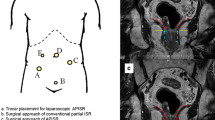Abstract
Introduction
The rectum remains a predominant subsite of colorectal cancer in the Indian population. Unique to the Indian setting are significant social repercussions associated with a permanent stoma. On account of this, many patients who are advised abdominal perineal excision of the rectum (APER) default treatment. Accurate demonstration of the intersphincteric plane with magnetic resonance imaging has made intersphincteric resection (ISR) a viable option. This study is aimed at determining the feasibility and oncological adequacy of ISR in the Indian scenario.
Material and Methods
All patients with low rectal cancer who underwent an ISR at the Tata Memorial Centre, from July 2013 to December 2013 were included. Patients with invasion of the external sphincter and suboptimal preoperative sphincter function were excluded. Following standard preoperative staging, patients with a threatened circumferential resection margin (CRM) and/or mesorectal nodes were given preoperative chemoradiotherapy. The oncological adequacy of the procedure was evaluated in terms of margin positivity (distal and CRMs) and lymph node yield. Short-term perioperative outcomes included 30-day mortality, postoperative morbidity, anastomotic leaks, and length of hospital stay.
Results
Thirty-three patients with low rectal cancer and a median age of 38 years underwent ISR during the defined study period. Twenty-three patients (70 %) underwent open surgery whereas ten patients received a laparoscopic resection. The median blood loss and hospital stay was 300 mL and 7 days, respectively. Two patients had an involved CRM, but all distal margins were free of tumor. The quality of total mesorectal excision was satisfactory in all patients with a median lymph node yield of 9 nodes.
Conclusions
Intersphincteric resection is feasible and oncologically safe in selected patients with low rectal cancer. Long-term functional and oncological outcomes are essential before it can be considered a viable alternative to APER.


Similar content being viewed by others
References
Jayne DG, Thorpe HC, Copeland J, Quirke P, Brown JM, Guillou PJ. Five-year follow-up of the Medical Research Council CLASICC trial of laparoscopically assisted versus open surgery for colorectal cancer. Br J Surg. 2010;97:1638–45.
Barreto SG, Chaubal GN, Talole S, et al. Rectal cancer in young Indians—are these cancers different compared to their older counterparts? Indian J Gastroenterol. 2014;33:146–50.
Mohandas KM. Colorectal cancer in India: controversies, enigmas and primary prevention. Indian J Gastroenterol. 2011;30:3–6.
Swaminathan R, Selvakumaran R, Esmy PO, et al. Cancer pattern and survival in a rural district in South India. Cancer Epidemiol. 2009;33:325–31.
Laurent C, Paumet T, Leblanc F, Denost Q, Rullier E. Intersphincteric resection for low rectal cancer: laparoscopic vs open surgery approach. Colorectal Dis. 2012;14:35–41.
Pechlivanides G, Gouvas N, Tsiaoussis J, et al. Lymph node clearance after total mesorectal excision for rectal cancer: laparoscopic versus open approach. Dig Dis. 2007;25:94–9.
Schiessel R, Karner-Hanusch J, Herbst F, Teleky B, Wunderlich M. Intersphincteric resection for low rectal tumours. Br J Surg. 1994;81:1376–8.
Denost Q, Laurent C, Capdepont M, Zerbib F, Rullier E. Risk factors for fecal incontinence after intersphincteric resection for rectal cancer. Dis Colon Rectum. 2011;54:963–8.
Bruheim K, Tveit KM, Skovlund E, et al. Sexual function in females after radiotherapy for rectal cancer. Acta Oncol. 2010;49:826–32.
Bruheim K, Guren MG, Dahl AA, et al. Sexual function in males after radiotherapy for rectal cancer. Int J Radiat Oncol Biol Phys. 2010;76:1012–7.
Akagi Y, Shirouzu K, Ogata Y, Kinugasa T. Oncologic outcomes of intersphincteric resection without preoperative chemoradiotherapy for very low rectal cancer. Surg Oncol. 2013;22:144–9.
Weiser MR, Quah HM, Shia J, et al. Sphincter preservation in low rectal cancer is facilitated by preoperative chemoradiation and intersphincteric dissection. Ann Surg. 2009;249:236–42.
Shiomi A, Kinugasa Y, Yamaguchi T, Tsukamoto S, Tomioka H, Kagawa H. Feasibility of laparoscopic intersphincteric resection for patients with cT1-T2 low rectal cancer. Dig Surg. 2013;30:272–7.
Kuo LJ, Hung CS, Wu CH, et al. Oncological and functional outcomes of intersphincteric resection for low rectal cancer. J Surg Res. 2011;170:e93–8.
Rullier E, Laurent C, Bretagnol F, Rullier A, Vendrely V, Zerbib F. Sphincter-saving resection for all rectal carcinomas: the end of the 2-cm distal rule. Ann Surg. 2005;241:465–9.
Spanos CP. Intersphincteric resection for low rectal cancer: an overview. Int J Surg Oncol. 2012;2012:241512.
Rullier E, Sa Cunha A, Couderc P, Rullier A, Gontier R, Saric J. Laparoscopic intersphincteric resection with coloplasty and coloanal anastomosis for mid and low rectal cancer. Br J Surg. 2003;90:445–51.
Martin ST, Heneghan HM, Winter DC. Systematic review and meta-analysis of outcomes following pathological complete response to neoadjuvant chemoradiotherapy for rectal cancer. Br J Surg. 2012;99:918–28.
Patel UB, Taylor F, Blomqvist L, et al. Magnetic resonance imaging-detected tumor response for locally advanced rectal cancer predicts survival outcomes: MERCURY experience. J Clin Oncol. 2011;29:3753–60.
Hanly AM, Ryan EM, Rogers AC, et al. Multicenter evaluation of rectal cancer reimaging post neoadjuvant (MERRION) therapy. Ann Surg. 2014;259:723–7.
Marijnen CA, Nagtegaal ID, Kapiteijn E, et al. Radiotherapy does not compensate for positive resection margins in rectal cancer patients: report of a multicenter randomized trial. Int J Radiat Oncol Biol Phys. 2003;55:1311–20.
Nagtegaal ID, Marijnen CA, Kranenbarg EK, et al. Circumferential margin involvement is still an important predictor of local recurrence in rectal carcinoma: not one millimeter but two millimeters is the limit. Am J Surg Pathol. 2002;26:350–7.
Akasu T, Takawa M, Yamamoto S, et al. Intersphincteric resection for very low rectal adenocarcinoma: univariate and multivariate analyses of risk factors for recurrence. Ann Surg Oncol. 2008;15:2668–76.
Conflict of interest
VP, AD, PP, RE, SA, and APS declare that they have no conflict of interest.
Ethics statement
The authors declare that the study was performed in a manner to conform with the Helsinki Declaration of 1975, as revised in 2000 and 2008 concerning Human and Animal Rights, and the authors followed the policy concerning Informed Consent as shown on Springer.com.
Author information
Authors and Affiliations
Corresponding author
Rights and permissions
About this article
Cite this article
Pai, V.D., De Souza, A., Patil, P. et al. Intersphincteric resection and hand-sewn coloanal anastomosis for low rectal cancer: Short-term outcomes in the Indian setting. Indian J Gastroenterol 34, 23–28 (2015). https://doi.org/10.1007/s12664-014-0522-7
Received:
Accepted:
Published:
Issue Date:
DOI: https://doi.org/10.1007/s12664-014-0522-7




